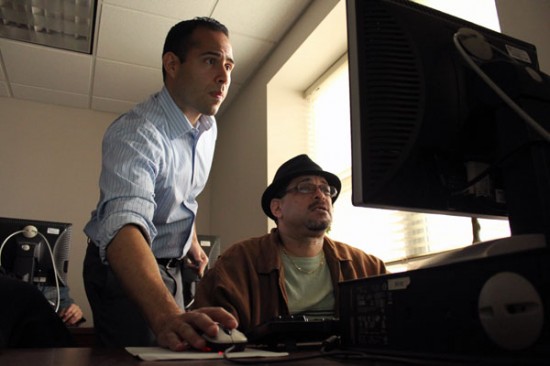
Classes connect residents to jobs and family on-line
By Vishal Persaud
persaud@mottthavenherald.com
Hunched over a keyboard in the second row of a computer lab at the Phipps Opportunity Center in Melrose, Ricardo Avillan, 51, chats with his grandsons in Puerto Rico on Facebook.
Avillan began making the trek across the 145th Street Bridge from East Harlem to the Bronx to attend computer classes every Monday and Wednesday because he realized that knowing how to use the Internet might give him a better chance to find a job. Learning to connect with his family via Facebook was a bonus.
“In my time when I was a kid, we made our toys, but now everything is different,” said Avillan.
While most Americans now hold the power of the Internet in the palm of their hand, many others still don’t know what it’s like to move a mouse on a desktop, much less the trackball on a Blackberry.
According to a report released by the Federal Communications Commission in February, 35 percent of Americans do not have a high-speed Internet connection at home. Among those, Hispanics make up the largest group.
Computer training centers like the one at Phipps Opportunity Center on Third Avenue and East 159th Street are a bridge across this digital divide.
“My job here is to build up an awareness and appreciation for all the possibilities that the Internet possesses,” said Angel Aracena, director of educational technology at the Phipps Community Development Corporation. Twice a week, he teaches local residents simple Internet navigation and more advanced uses of the Internet, including how to pay bills or shop online.
The center has 19 computers in a small lab at the back of the opportunity center. Most of the people who use the computers live in the apartment building that houses the center, according to Rosemary Ordonez-Jenkins, assistant executive director for adult and family services at Phipps.
Many of the residents who attend Aracena’s classes had never used a computer or browsed a website.
A study by the National Broadband Plan Consumer Survey found that people who do not subscribe to a high-speed Internet connection cite three main reasons: affordability, lack of computer education and relevance to their lives.
That agrees with Aracena’s observation. “It’s not part of their priorities,” he said.
But the inability to use the Internet magnifies the problems that affect low-income people and immigrants, said David Birdsell, Dean of Public Affairs at Baruch College.
Those without Internet know-how or access “are less able to take advantage of educational and small business opportunities and are less able to stay in touch with their neighborhoods,” Birdsell said. “The Internet is a prerequisite for full participation in society.”
“It would help me get a lot more information on things that I need to know as far as working and even school,” said Carlos Ortiz, 23, who attended the class at Phipps as part of training for Justice Corps, a program that helps young adults acquire practical skills to find jobs and become more involved in their communities.
Ortiz has only a few, scattered opportunities to use a computer. He can go on-line briefly on the computer his mother has for work, in class or when he gets a chance to go to the library.
The Obama administration proposed a National Broadband Plan that calls on Congress to address the need to make the Internet more available through discounts for broadband service and computer training for low-income Americans, including the creation of a Digital Literacy Corps to provide hands-on computer instruction. The plan would also target training centers like the Phipps Opportunity Center and libraries to increase their capacity to help with the education training.
If discounts were available, residents like Providencia Maisonet, 58, might be able to subscribe to the Internet at home.
“It’s $50 dollars a month, and I’m paying for Internet on my cell phone, so I don’t know what to do,” said Maisonet, who attends the Phipps class and recently bought a laptop to practice things she’s learned.
Ricardo Avillan has also bought a laptop based on recommendations from Aracena. Once he learns enough, he wants to use it to write music, but also to apply for jobs.
His search for work brought him to the Phipps Opportunity Center, when he found that employers were referring him to their websites to find their applications for work. He couldn’t follow through, he said, because he didn’t have a computer or know how to use the Internet.
“I understand now that I have to know about computers,” Avillan said.
